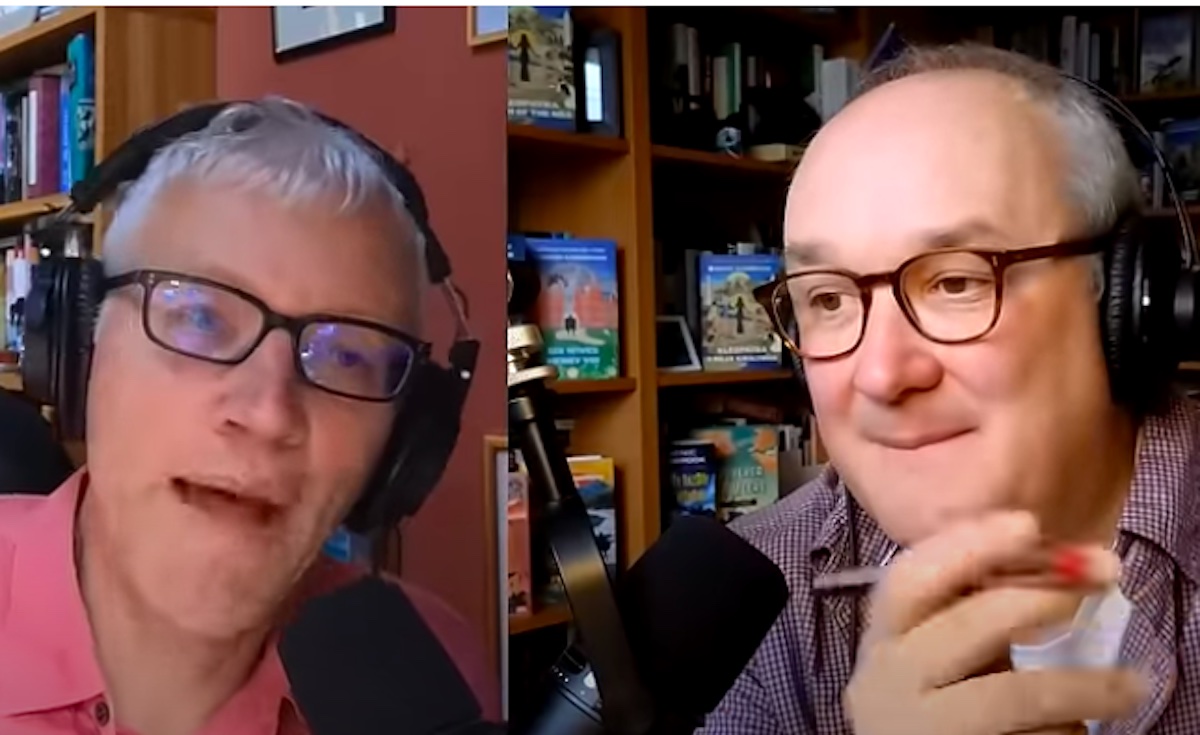As the audience breaks into a rapturous ovation when he and his colleague enter the stage to the sound of music, balding, bespectacled Dominic Sandbrook ruefully shakes his head. “What on Earth?” Sandbrook thinks. “This doesn’t happen to historians.”
Except now it does. Sandbrook and Tom Holland have experienced the same adulation in venues from New York to New Zealand, Los Angeles to London, attracting fans who aren’t content with merely hearing or watching them on Apple Podcasts, Spotify or YouTube but who must see them in the flesh as well.
What’s so mesmerising about these two middle-aged, Oxbridge-educated historians that they have become media sensations? Their patter about the past.
The Rest Is History
Their show – The Rest Is History – is one of the most popular podcasts today, downloaded 12.5 million times a month, according to Bloomberg. One reason the fans love the show is the hosts wear their learning so lightly.
Presenting more than one episode a week recently, Sandbrook and Holland have ranged from Charlemagne to Beethoven, from Eva Peron to Hitler. In each episode, they focus on a particular historical figure or incident but touch on others, too, adding variety and richness.
Talking of Eva Peron, for example, the hosts sang snatches of “Don’t Cry For Me, Argentina” and discussed Margaret Thatcher, Ronald Reagan and Argentinian history. The chatty, genial manner of discussion and the vast range covered have made the show a hit.
There are other popular history podcasts, such as Dan Carlin’s Hardcore History and the BBC’s You’re Dead To Me. Their preoccupation with the past might seem out of step in an age of rapid innovations and ceaseless speculation about the future, but they are part of the zeitgeist.
The early 21st century is turning out to be a golden age for history.
Google’s Ngram viewer, which covers printed sources up to 2022, indicates a considerable increase in writing about history over the past decade.
In 2023, people in the UK and Ireland spent more on history books than at any point since Nielsen BookData’s records began in 1998, says Bloomberg. In the US, where the overall book market is flat, history has grown by 6% in the past year alone, according to Circana.
For the first time in an election year, history outsold politics (by two to one).
Gary Lineker founder
The success of The Rest Is History has rubbed off on its producer, Goalhanger Podcasts. Former footballer Gary Lineker founded the company with two partners. Podcasts, however, were an afterthought.
Lineker and an associate originally started Goalhanger Films, making sports documentaries. In 2019, it started making a World War II podcast called We Have Ways of Making You Talk. The podcast’s popularity led the company to launch another history show.
Started in 2020, The Rest Is History built up a fan base and inspired other similarly titled podcasts – The Rest Is Politics and The Rest Is Entertainment, both Goalhanger productions.
Pioneer Dan Carlin
Long before Goalhanger, there were others podcasting – notably Dan Carlin, an American radio journalist who may be called a pioneering history podcaster. He has been recording his Hardcore History podcast since 2006. His first episode was only 16 minutes long.
“Today, his episodes run six hours, and fans happily pay up to $100 for episode packages. His meticulous research – spending six to eight months per episode, with two months dedicated purely to reading – has earned him millions of loyal listeners,” says Bloomberg.
Carlin says there is an audience for history podcasts today because we are an ageing society.
There is a second explanation—times of upheaval and rapid transformation kindle interest in the past. Victorians, amid their industrial revolution, became obsessed with dinosaurs and ancient Egypt.
As the world changed after the Second World War, there was a boom in historical epics like Ben-Hur and Spartacus. The dizzying pace of innovations changing the world today may be leading to a longing for history.
Incidentally, history podcasts are not an exclusively Anglo-American speciality. There are podcasts on the history of East Asia, Southeast Asia, and India. The Singaporean historian PJ Thun created The History of Singapore podcast.
William Dalrymple and Anita Anand weighed in with Empire.
Sandbrook speaks from experience about why the audience loves a show like The Rest Is History: “They love the stories. They love the characters. They love the feeling of being catapulted back to the past.”
Travelling back in time, recalling life in another age, can be a journey of discovery. Mary Beard, the classics editor of The Times Literary Supplement who lectured for years at Cambridge, memorably expressed the abiding fascination with history:
“For me, the ability to think about the world 2,000 years ago is as exciting and as mind-blowing as our speculation about life on Mars.”

